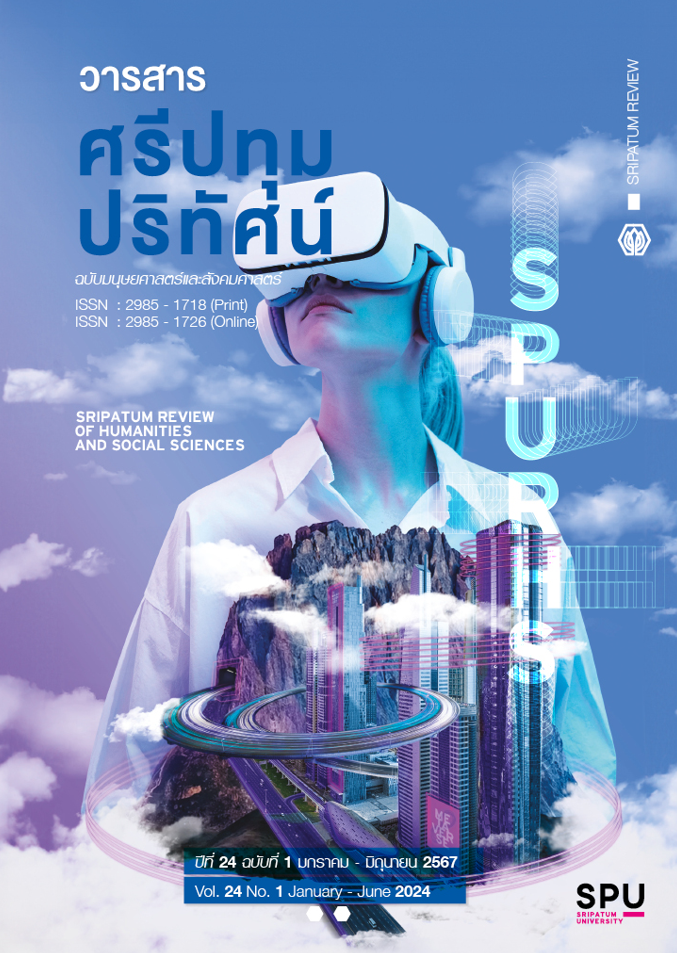การพัฒนารูปแบบการเรียนการสอนโดยใช้ทฤษฎีสรรคนิยมที่เน้นกระบวนการทางสังคม เป็นฐาน เพื่อส่งเสริมทักษะการสื่อสารและซอฟต์สกิลของผู้เรียนระดับชั้นมัธยมศึกษาปีที่ 6 ในการเรียนรู้วิชาภาษาอังกฤษ
Main Article Content
บทคัดย่อ
การวิจัยครั้งนี้ มีวัตถุประสงค์เพื่อ (1) พัฒนารูปแบบการเรียนการสอนโดยใช้ทฤษฎีสรรคนิยมที่เน้นกระบวนการทางสังคมเป็นฐาน เพื่อส่งเสริมทักษะการสื่อสารและซอฟต์สกิลของผู้เรียนระดับชั้นมัธยมศึกษา ปีที่ 6 ในการเรียนรู้วิชาภาษาอังกฤษ และ (2) ศึกษาประสิทธิผลของการใช้รูปแบบการเรียนการสอนฯ การดำเนินการวิจัยและพัฒนา แบ่งเป็น 2 ระยะ กลุ่มตัวอย่าง คือ ผู้เรียนระดับชั้นมัธยมศึกษาปีที่ 6/2 แผนการเรียนศิลป์ภาษา โรงเรียนโกวิทธำรงเชียงใหม่ อำเภอเมือง จังหวัดเชียงใหม่ ปีการศึกษา 2566 จำนวน 35 คน ได้มาโดยการเลือกแบบเจาะจง เครื่องมือที่ใช้ในการวิจัย คือ (1) แบบทดสอบ (2) แบบประเมินทักษะการสื่อสาร (3) แบบประเมินซอฟต์สกิล ด้านการทำงานร่วมกับผู้อื่นและการแก้ปัญหา และ (4) แบบสอบถามความคิดเห็นของผู้เรียนที่มีต่อรูปแบบการเรียนการสอนฯ การวิเคราะห์ข้อมูลใช้การหาเฉลี่ย ส่วนเบี่ยงเบนมาตรฐาน ค่าสัมประสิทธิ์การแปรผัน สถิติทดสอบทีและค่าความก้าวหน้าสัมพัทธ์ ผลการวิจัย พบว่า
(1) รูปแบบการเรียนการสอนฯ ที่พัฒนาขึ้น มี 5 องค์ประกอบ คือ 1) หลักการของรูปแบบการเรียนการสอน 2) วัตถุประสงค์ของรูปแบบการเรียนการสอน 3) กระบวนการจัดกิจกรรมการเรียนรู้ 4) การวัดและประเมินผลของรูปแบบการเรียนการสอน และ 5) ปัจจัยสนับสนุนการจัดกิจกรรมการเรียนรู้ และ (2) ผู้เรียนมีทักษะการสื่อสารสูงกว่าก่อนใช้รูปแบบการเรียนการสอนฯ อย่างมีนัยสำคัญทางสถิติที่ระดับ 0.05 มีค่าเฉลี่ยความก้าวหน้าสัมพัทธ์ของทักษะการสื่อสารเท่ากับ 51.85 ซอฟต์สกิลด้านการทำงานร่วมกับผู้อื่น เท่ากับ 54.64 มีพัฒนาการอยู่ในระดับสูง และด้านการแก้ปัญหา เท่ากับ 37.15 พัฒนาการอยู่ในระดับปานกลาง ทั้งนี้ ผู้เรียนมีความคิดเห็นต่อการจัดการเรียนการสอนตามรูปแบบการเรียนการสอนฯ อยู่ในระดับมากที่สุด
Article Details

อนุญาตภายใต้เงื่อนไข Creative Commons Attribution-NonCommercial-NoDerivatives 4.0 International License.
1. กองบรรณาธิการสงวนสิทธิ์ในการพิจารณาและตัดสินการตีพิมพ์บทความในวารสาร
2. บทความทุกเรื่องจะได้รับการตรวจสอบทางวิชาการโดยผู้ทรงคุณวุฒิ แต่ข้อความและเนื้อหาในบทความที่ตีพิมพ์เป็นความรับผิดชอบของผู้เขียนแต่เพียงผู้เดียว มิใช่ความคิดเห็นและความรับผิดชอบของมหาวิทยาลัยศรีปทุม
3.การคัดลอกอ้างอิงต้องดำเนินการตามการปฏิบัติในหมู่นักวิชาการโดยทั่วไป และสอดคล้องกับกฎหมายที่เกี่ยวข้อง
เอกสารอ้างอิง
กระทรวงศึกษาธิการ. (2560). หลักสูตรแกนกลางการศึกษาขั้นพื้นฐาน พุธศักราช 2551 ปรับปรุง 2560.
กรุงเทพฯ: โรงพิมพ์ชุมชุมสหกรณ์การเกษตรแห่งประเทศไทย จำกัด.
คณะกรรมการอิสระเพื่อการปฏิรูปการศึกษา. (2561). แผนการปฏิรูปประเทศด้านการศึกษา. กรุงเทพฯ: สำนักงานเลขาธิการสภาการศึกษา.
นภศร มิลินทานุช. (2561). การพัฒนาทักษะการทำงานเป็นทีมและจิตสาธารณะของนักเรียนชั้นมัธยมศึกษาปี ที่ 2 นักเรียนห้องพิเศษวิทยาศาสตร์ (สสวท.) ด้วยการเรียนรู้แบบร่วมมือในสาระหน้าที่พลเมือง วัฒนธรรมและการดำเนินชีวิต. วิทยานิพนธ์การศึกษามหาบัณฑิต. มหาวิทยาลัยศรนครินทรวิโรฒ. กรุงเทพฯ.
ปกรณ์ ประจันบาน. (2552). สถิติขั้นสูงสำหรับการวิจัยปละประเมิน (Advanced Statistics for Research and Evaluation). พิษณุโลก: มหาวิทยาลัยนเรศวร.
พิมพันธ์ เดชะคุปต์. (2544). การเรียนการสอนที่เน้นผู้เรียนเป็นสำคัญ:แนวคิด วิธีและเทคนิคการสอน 1. กรุงเทพฯ : เดอะมาสเตอร์กรุ๊ป แมเนจเม้นท์.
วิชัย วงษ์ใหญ่ และมารุต พัฒผล. (2562). Soft Skills to Master. กรุงเทพฯ: บัณฑิตวิทยาลัย มหาวิทยาลัย ศรีนครินทรวิโรฒ.
ศิริชัย กาญจนวาสี. (2559). การเลือกใช้สถิติที่เหมาะสมสำหรับการวิจัย. กรุงเทพฯ: สำนักพิมพ์แห่ง จุฬาลงกรณ์มหาวิทยาลัย.
สมบัติ คชสิทธิ์, จันทนี อินทรสูตร และธนกร สุวรรณพฤฒิ. (2560). การจัดการเรียนรู้ภาษาอังกฤษให้กับ ผู้เรียนยุค THAILAND 4.0. วารสารวไลยอลงกรณ์ปริทัศน์ (มนุษยศาสตร์และสังคมศาสตร์). 7(2), 175-186.
สุรัตน์ แท่นประเสริฐกุล. (2556). รายงานการประชุมสัมมนาทางวิชาการ เรื่องการพัฒนาการเรียนรู้เพื่อ สร้างสรรค์ด้วยปัญญาแห่งประเทศไทย ครั้งที่ 1. กรุงเทพฯ: สำนักงานเลขาธิการสภาการศึกษา.
สุวิทย์ มูลคำ และอรทัย มูลคำ. (2546). 19 วิธีจัดการเรียนรู้: เพื่อพัฒนาความรู้และทักษะ. กรุงเทพฯ :ภาพ พิมพ์
สุวิมล ว่องวาณิช. (2558). การวิจัยประเมินความต้องการจำเป็น. กรุงเทพฯ: สำนักพิมพ์แห่งจุฬาลงกรณ์ มหาวิทยาลัย.
สำนักงานคณะกรรมการการศึกษาขั้นพื้นฐาน. (2558). คู่มือการจัดการเรียนการสอนภาษาอังกฤษแนวใหม่ ตามกรอบมาตรฐานความสามารถทางภาษาอังกฤษที่เป็นสากล The Common European Framework of Reference for Languages (CEFR). กรุงเทพฯ:โรงพิมพ์ชุมชุมสหกรณ์ การเกษตรแห่งประเทศไทย จำกัด.
สำนักงานเลขาธิการสภาการศึกษา. (2560). แผนการศึกษาแห่งชาติ พ.ศ. 2560-2579. กรุงเทพฯ :บริษัทพริก หวานกราฟฟิค จำกัด.
สำนักงานเลขาธิการสภาการศึกษา. (2562). แนวทางการพัฒนาสมรรถนะผู้เรียนระดับการศึกษาขั้นพื้นฐาน. กรุงเทพฯ: บริษัท 21 เซ็นจูรี่ จํากัด.
อาทิตย์ อินต๊ะแก้ว. (2560). การศึกษาและพัฒนารูปแบบการเรียนรู้ภาษอังกฤษของผู้เรียนระดับอุดมศึกษา เพื่อส่งเสริมทักษะการฟังและการพูดภาษาอังกฤษ :การวิจัยแบบผสมผสานวิธีการ. ปริญญานิพนธ์ ดุษฎีบัณฑิต. มหาวิทยาลัยศรีนครินทรวิโรฒ. กรุงเทพฯ.
Azwar, A. (2019). Integrating the English Language Teaching and Learning Process with Soft
Skills. International Conference on Education and Language 2013, UBL, Indonesia, (365-371).
Beghoul, Y., & Chelghoum, A. (2020). Use of the Social Constructivist Approach in Teaching Oral Skill to First Year BA Students of English. In The Second National Conference on Language, Mind and Learner’s Cognitive Capacities.
Bronson, E. (2007). Career and technical education is ideally suited to teaching students the
soft skills needed to succeed in the 21st century workplace. Techniques: Connecting Education & Career, 82(7), 30-31.
Brooks, R., Flanders, A., Jones, M., Kane, S. P., McKissick, J. C., & Shepherd, T. (2008). A
study of workforce training needs for the agribusiness industry in Georgia. The University of Georgia, Center for Agribusiness and Economic Development. Athens: University of Georgia Research Foundation.
Han, L. (2011). Soft Skills Lists-28 Skills to Working Smart. Retrieved 4 March 2023 from http://bemycareercoach.com/soft-skills/hard-skills-soft-skills.htmi.
Hui Zhao. (2020). Explicating the social constructionist perspective on crisis communication and crisis management research: a review of communication and business journals. Journal of Public Relations Research. 32(1):1-22
Joyce, B., Weil, M. & Calhoun, E. (2009). Model of Teaching (8th ed). London: Allyn and
Bacon.
Mtsweni, E. S., Horne, T., & ven der Poll, J. A. (2016). Soft Skills for Software Project Team
Members. International Journal of Computer Theory and Engineering, 8(2), 150-155.
Ravindran, K., & Bandara, C. M. Y. S. S. (2015). Factors Affecting Acquisition of Soft Skills
and the Level of Soft Skills Among University Undergraduates. International Research Symposium Rajarata University of Sri Lanka, 538-545.
Savignon, J. S. (1983). Communicative competence: Theory and classroom practice. Reading, MA: Addison-Wesley.
Schneider, C. G. (2015). The LEAP Challenge: Transforming for Students, Essential for Liberal
Education. Liberal Education, 101(1/2).


